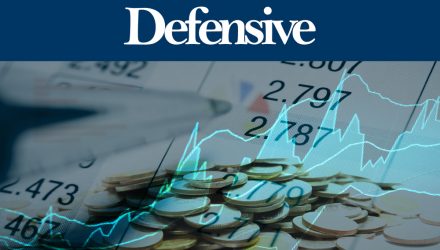Utilities sector-related exchange traded funds were among the best areas leading the charge in U.S. markets Tuesday as investors looked to an attractive income-generating opportunity in a lower-for-longer yield environment.
Among the best performing non-leveraged ETFs of Tuesday, the Utilities Select Sector SPDR (NYSEArca: XLU) rose 11.9%, Fidelity MSCI Utilities Index ETF (NYSEARCA: FUTY) gained 11.7% and Vanguard Utilities ETF (NYSEARCA: VPU) increased 11.8%.
The defensive utilities sector typically covers more stable stocks since the demand for their services, notably electricity and gas, is steady from both consumers and businesses. Moreover, in a lower-for-longer yield environment, utilities come with more attractive above-average dividends.
The utilities sector’s regulated earnings and high payouts mean they are often treated as bond proxies, and their yields exhibit a close relationship to corporate debt yields.
Comparing the utilities dividend yields to interest rates and debt markets, the spread between utility yields and the bond index was at about 74 basis points at Friday’s close, compared to the 118 point 10-year average, which suggests utilities may decouple even if volatility remains elevated in the bond market, Bloomberg reports.
The Federal Reserve has recently cut interest rates by 100 basis points to near zero and implemented a number of accommodative measures to bolster liquidity, which should at the very least keep a cap on yields.
Furthermore, as a domestic sector that many consumers rely on, regardless of the economic environment, power and gas demand will continue to see steady demand, compared to other areas of the economy that are already suffering through fundamental shocks. The sector also exhibits a law of correlation with GDP growth over the long term.
Consequently, looking ahead toward the upcoming S&P earnings season, even if other sector earnings continue to drop, those of utilities should remain relatively insulated. However, looking toward a more long-term view, it is likely the more beaten-down sectors directly affected by everyone staying home will outperform as they recover.
For more information on the utilities sector, visit our utilities category.








